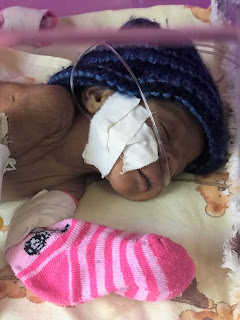four preems in one incubator today . . it doesn't get much more vulnerable than this
James 1:27 says "Pure and undefiled religion before God and the Father is this: to visit orphans and widows in their trouble, and to keep oneself unspotted from the world."
Active mercy, and deliberate counter-cultural living. These two threads twine together when God's people pour their lives into the most vulnerable. So many Kingdom parables talk about the small, the overlooked, the fragile, the margins.
There are countless ways to love orphans and vulnerable children (and widows), but lately I've been asked a few times about our Serge East and Central Africa approach, so here'a a brief overview.
Embracing presence: we go to the places where the orphans and the vulnerable live. Most measures of childhood risk light up the maps of sub-Saharan Africa, as well as India and South-East Asia. That's where we are, in the villages and city streets, in the hospitals and schools. We're not sending ideas from afar, we're walking alongside.
Empowering community capacity: our primary method of visiting the orphans and vulnerable is to provide the means for their extended family to care for them. This can look like food supplements for surrogate breast-feeding aunts and grandmothers when a mother dies. Or dairy goats for families with HIV. Or house-building for widows caring for children. Or producing a locally sourced nutrition supplement, so that the weekly gatherings provide touchpoints for care and education and function as a support group for the weary (see here and here and here). Africans have been caring for their orphans and vulnerable kids for millennia; we're not here to change that but rather to bow to justice in sharing what we've been given.
Breaking generational cycles: one of our biggest projects, which has been a battle for every inch of progress, has been Christ School Bundibugyo. The school subsidy allows students from one of the poorest places in Africa to receive the best education in the district. But we also provide full scholarships for about 20% of the student body through the OVC program. Most of our teams have a strong educational component to pass skills on, and we attempt to focus on the most marginalized as we do. This enables the last to become first, which is a Kingdom-coming moment.
Seeing individuals: across our countries of work, our teams have set up sponsorships for individual OVC's. God sees first, and we follow. Today alone, I had texts from three different young people whom we've sent to laboratory school, medical school, and nursing school. Others have become math teachers or pastors or seamstresses. Our teams want to be the catalysts that change lives, for those who would have otherwise had no dream of such opportunity. And we see them now turning back to their communities to seek out and bless others like themselves.
Safe places and fun: orphans and vulnerable kids need counseling. They need after-school programs, tutoring, discipleship and sports. They need coaches and pastors and teachers and friends. They need skills training and support. Just one person in a child's life can prove to be the channel of belief, fostering potential, cheering them on, giving them an alternative to the hard losses in their lives. It's so much fun to see a pack of kids playing football or drawing pictures or listening to stories.
Survival: much of our Serge area works on a very basic level to just enable children to survive, to provide safe deliveries so they won't become orphans, to provide decent care for their illnesses, immunizations, growth monitoring, clean water and sanitation. Day and night, we're working with our local partners to care for the most vulnerable.
There are excellent organizations that run orphanages; Serge is not one of them. Quite a few of our missionaries are adoptive parents, which makes sense as the same people whose heart for the hurting propels them across the world also tend to want to give a home to an individual child, but we are also not an adoption agency. The places we work are mostly very traditional in culture, with an extended family network to absorb their orphans and vulnerable kids. So we have chosen to focus on community-based efforts to strengthen capacity and build resilience, to enable children to remain integrally part of their culture while also having enough to eat and a decent education. It's not the only model, and there are always exceptional circumstances that look different, but generally that's our modus operandi.
Jesus tells us that as we pour ourselves out for the least of these, we actually in some true but mysterious way encounter him in the process.
Pray for our workers; the fractured systems take a toll, the reality of vulnerability means we see too much death. Follow some of the links above if you want to join in a material way, putting your resources into high-impact places. And consider what kind of true religion you seek. According to James, it's not about winning political power and influence, but visiting--actually GOING TO--the orphans and widows. We need teachers and coaches and nurses and nutritionists and artists and therapists and pastors and counselors and builders and engineers and probably gifted people we haven't even thought of. Here's the link to find out more!
A few OVC's from my world today . . .

























